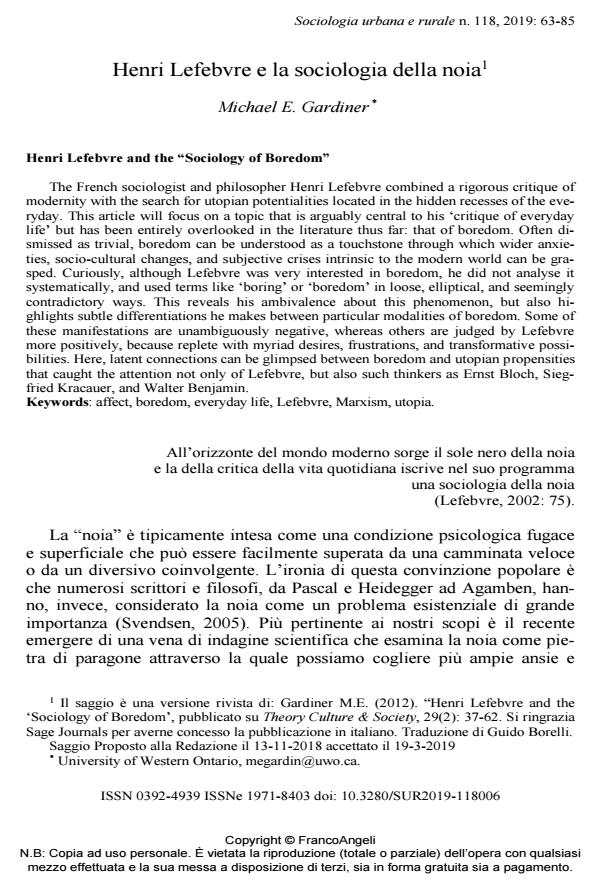Henri Lefebvre e la sociologia della noia
Titolo Rivista SOCIOLOGIA URBANA E RURALE
Autori/Curatori Michael E. Gardiner
Anno di pubblicazione 2019 Fascicolo 2019/118
Lingua Italiano Numero pagine 23 P. 63-85 Dimensione file 500 KB
DOI 10.3280/SUR2019-118006
Il DOI è il codice a barre della proprietà intellettuale: per saperne di più
clicca qui
Qui sotto puoi vedere in anteprima la prima pagina di questo articolo.
Se questo articolo ti interessa, lo puoi acquistare (e scaricare in formato pdf) seguendo le facili indicazioni per acquistare il download credit. Acquista Download Credits per scaricare questo Articolo in formato PDF

FrancoAngeli è membro della Publishers International Linking Association, Inc (PILA)associazione indipendente e non profit per facilitare (attraverso i servizi tecnologici implementati da CrossRef.org) l’accesso degli studiosi ai contenuti digitali nelle pubblicazioni professionali e scientifiche
The French sociologist and philosopher Henri Lefebvre combined a rigorous critique of modernity with the search for utopian potentialities located in the hidden recesses of the every-day. This article will focus on a topic that is arguably central to his ‘critique of everyday life’ but has been entirely overlooked in the literature thus far: that of boredom. Often dismissed as trivial, boredom can be understood as a touchstone through which wider anxieties, socio-cultural changes, and subjective crises intrinsic to the modern world can be grasped. Cu-riously, although Lefebvre was very interested in boredom, he did not analyse it systematical-ly, and used terms like ‘boring’ or ‘boredom’ in loose, elliptical, and seemingly contradictory ways. This reveals his ambivalence about this phenomenon, but also highlights subtle diffe-rentiations he makes between particular modalities of boredom. Some of these manifestations are unambiguously negative, whereas others are judged by Lefebvre more positively, because replete with myriad desires, frustrations, and transformative possibilities. Here, latent connec-tions can be glimpsed between boredom and utopian propensities that caught the attention not only of Lefebvre, but also such thinkers as Ernst Bloch, Siegfried Kracauer, and Walter Ben-jamin.
Parole chiave:Affect, boredom, everyday life, Lefebvre, Marxism, utopia.
Michael E. Gardiner, Henri Lefebvre e la sociologia della noia in "SOCIOLOGIA URBANA E RURALE" 118/2019, pp 63-85, DOI: 10.3280/SUR2019-118006